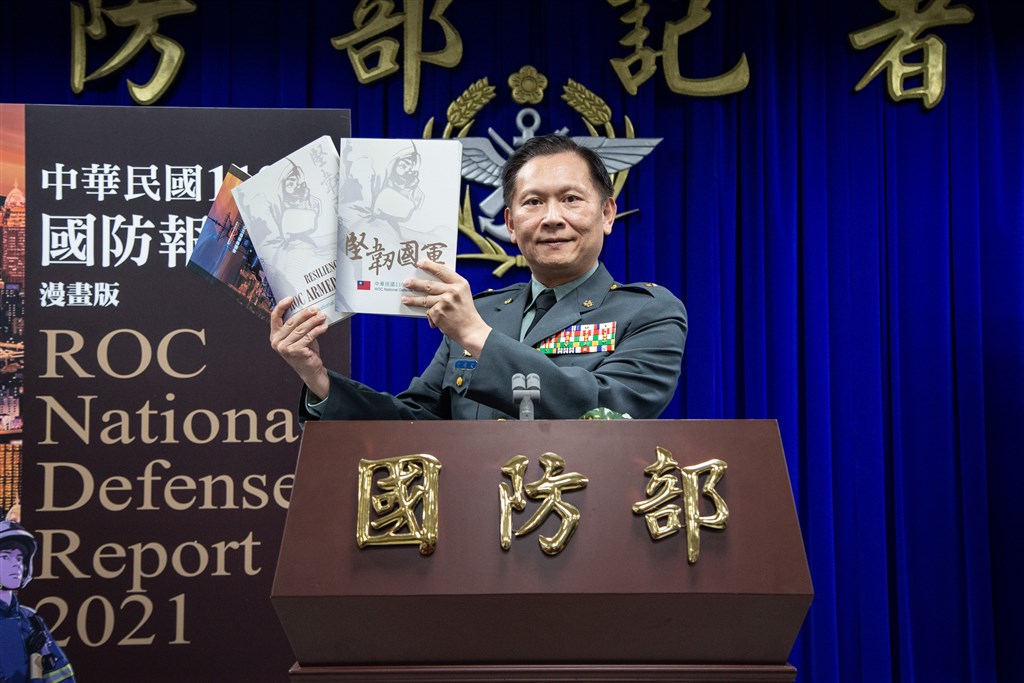
Taipei, Nov. 9 (CNA) Taiwan's Ministry of National Defense (MND) said in its latest report Tuesday that China's gray zone threats are an attempt to ultimately seize Taiwan "without a fight."
The "ROC National Defense Report 2021," released simultaneously in English and Chinese for the first time, included a section that detailed the risks of China's cyberwarfare and cognitive warfare threats against Taiwan.
In recent years, China's frequent gray zone threats against Taiwan have become highly diversified and have been orchestrated generally through military and non-military approaches, the MND said in the report.
That military approach has taken the form of frequent intrusions by Chinese aircraft into the southwestern corner of Taiwan's Air Defense Identification Zone (ADIZ) and military drills in the vicinity of the Dongsha Islands, the report said.
The non-military approach has been evident in actions such as China speedboats ramming Taiwan's coastguard vessels and the illegal operations of China's sand pump dredgers in waters near Taiwan, the MND said in the report.
"These approaches have normally exploited the limbo between peace and war and (have veered) on the brink of a war," the report stated.
The People's Republic of China (PRC) is considered to be gradually escalating the threat level by "manipulating these salami tactics and is using its political and military power to shape a posture to its advantage," the report said.
Such intimidation tactics not only stretch Taiwan's combat power and shake its faith and morale, but also attempt to alter or challenge the status quo in the Taiwan Strait to ultimately achieve China's goal of "seizing Taiwan without a fight," according to the MND report.
It said the PRC continues to increase its defense budget, pouring more resources into its defense and military modernization.
"With more diversified strategies and approaches towards Taiwan at its disposal, the PRC is undertaking a variety of military incursions to test our early warning and response system and carry on its military intimidation and pressure against us," the MND said.
In terms of threats of cyberwarfare, China has been vigorously enhancing its capabilities through organizational reform and realignment, over the years, according to the report.
In peacetime, China's cyber activities are centered on gathering or stealing intelligence, getting hold of key nodes of subject systems, and compiling a targeting list for cyberattacks in the precision strike phase of any future operations, the report said.
In wartime, these activities can be transitioned to sabotaging and destroying the subject's national critical infrastructures and Command and Control (C2) systems to cause chaos in the society and decimate internal security and government functions, according to the report.
In the area of cognitive warfare, China is trying squeeze Taiwan's international space and force it to accept Beijing's political wishes, the report said.
Meanwhile, China is also using its economic leverage to solicit the support of Taiwan's business sector and people.
Psychologically, China is trying to cause disarray and confusion, in order to weaken Taiwan's fighting will and its determination to defend itself, and to dominate public opinion, according to the report.
The biennial MND report, first issued in 1992, was published this year under the theme "Forging a Resilient and New Armed Forces," with the MND also highlighting the efforts of Taiwan's Armed Forces to develop asymmetric capabilities and enhance their overall combat power in response to China's growing military coercion.
Lee Che-chuan (李哲全), chief of the Division of National Security and Decision-Making at the Institute for National Defense and Security Research, said the MND this year included gray zone threats in the report to raise awareness of the danger to national security.
Some people see cognitive warfare as "propaganda," but it could also denote soft power aimed at exerting a subtle influence on people in the long run, Lee said.
No comments:
Post a Comment